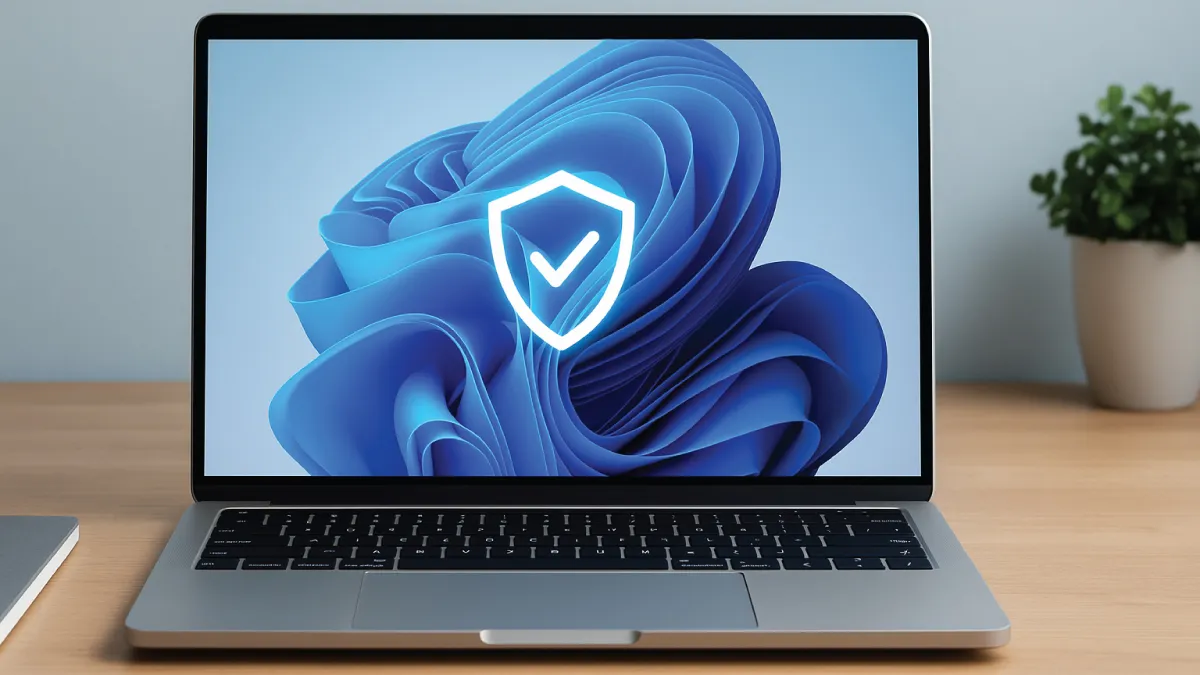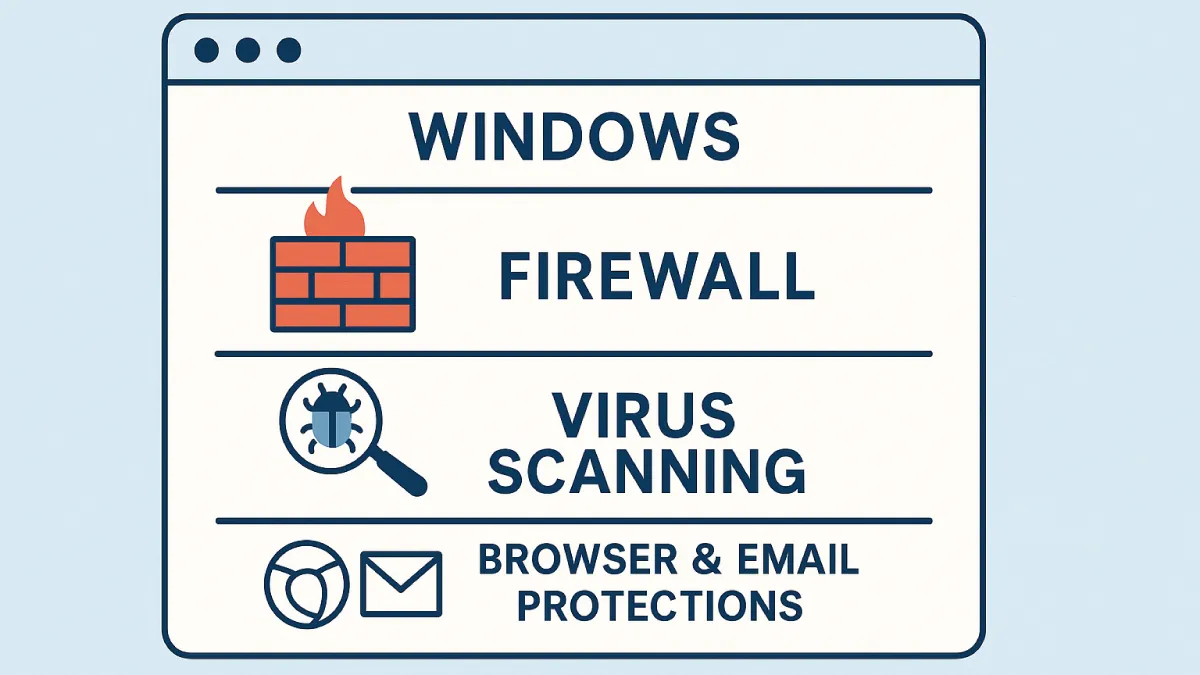
Do you need antivirus protection on your Windows PC in 2025? It’s a common question among both home users and corporate IT managers, and the answer isn’t always straightforward. Many people struggle with whether do you need antivirus or not, especially now that Windows offers built-in security by default. With cyber threats evolving and Windows now offering integrated safeguards, confusion abounds. Skipping protection altogether can be risky – modern malware can steal data, encrypt files, or disrupt business operations.
At the same time, confusion abounds about whether the default Windows security (formerly known as Windows Defender) is enough on its own. For anyone who’s asked themselves “do you need antivirus” given these mixed messages, this guide will provide clarity. Drawing on cybersecurity expertise (including insights from technicians at Esmond Service Centre), we’ll answer the question “do you need antivirus” in 2025 by examining what’s at stake for both everyday users and organizations.
The online threat landscape in 2025 is more perilous than ever. With new dangers emerging every day, one might well ask – do you need antivirus protection to withstand them? Cybercriminals continue to develop new viruses, ransomware, spyware, and other malware at an alarming rate. In fact, the independent AV-TEST Institute registers over 350,000 new pieces of malware every single day. These threats aren’t abstract statistics – they translate into real risks like stolen personal information, drained bank accounts, or lost business data. For example, ransomware alone is estimated to be involved in roughly 27% of all malware attacks right now, and it remains one of the costliest threats for small businesses.
Home users face dangers like identity theft or irretrievable family photos if a virus strikes, while companies could suffer costly downtime or data breaches. The key takeaway is that malware is not a problem of the past; it’s a present and growing risk. For anyone wondering whether do you need antivirus in such a hostile environment, the short answer is that some form of protection is crucial – the real question is which protections and how much you need.

A big reason many people ask “do you need antivirus software anymore?” is that Windows 10 and Windows 11 come with built-in protection. Microsoft includes an integrated security suite in Windows that provides real-time virus scanning, a firewall, and other defenses – all at no extra cost or installation. Over the years, these built-in protections have improved greatly. Independent tests now often give Windows’ built-in antivirus a perfect 6/6 score in protection, performance, and usability, rivaling the detection rates of premium antivirus programs. Perhaps not surprisingly, this level of performance raises the question: do you need antivirus from third-party vendors when the default option is so effective? In addition, security is now layered across your computing experience. Major web browsers can detect and block malicious websites or warn about dangerous downloads, and email providers scan attachments for viruses and filter phishing attempts.
The SmartScreen filter built into Windows will also warn you if you try to run unrecognized apps. In short, your Windows PC isn’t defenseless out of the box – it has a robust baseline of security. For many users who practice safe habits, these built-in protections already cover the essentials. Still, many users are left asking do you need antivirus from an outside provider given these built-in defenses – the next step is determining if additional protection is warranted for you.
If Windows has its own defenses, do you need antivirus from a third-party vendor at all? The answer for most people in 2025 is “maybe not, but it depends on your situation.” While the average user with good browsing habits can often rely on Windows’ integrated security, there are scenarios where adding an antivirus program makes sense:
High-Risk Online Activity: If you frequently download software from various websites, use file-sharing networks, or venture into the darker corners of the internet, you might still need antivirus software as an extra precaution. You’re engaging with more potential threats than the average user, so in these circumstances the answer to “do you need antivirus” is almost certainly yes. A dedicated antivirus can catch certain unwanted programs or risky downloads that built-in tools might let through as benign.
Handling Sensitive Data: Users who deal with highly sensitive or confidential information (for example, running a business from their PC or managing customer data) may want the additional peace of mind and advanced features some antivirus suites offer beyond basic virus scanning. In fact, for anyone handling highly sensitive data, the answer to “do you need antivirus” beyond the basics is usually "yes" – it’s wise to err on the side of caution. Extra features can include things like anti-phishing web protection, file encryption, or identity theft monitoring – capabilities beyond basic virus scanning.
Business and Compliance: Corporate Windows users often require antivirus by policy. In a corporate environment, the question “do you need antivirus?” typically gets a "yes" – companies often require endpoint security software to comply with standards and centrally manage protection on all employee machines. It’s not that Windows isn’t secure, but businesses need the reporting and consistency that enterprise antivirus/endpoint solutions provide. In a business setting, antivirus is usually mandatory to meet cybersecurity compliance and protect against large-scale threats.
Desired Extra Features: Premium security products sometimes bundle useful tools – password managers, secure VPNs, webcam/microphone blockers, or ransomware roll-back features. For users interested in these extras, do you need antivirus to get them? If you value convenience, an antivirus suite packages them together – otherwise, you might obtain such tools separately without a full security suite. Just remember that these suites can sometimes be resource-intensive (potentially slowing your system) and might duplicate functionality you could get via dedicated apps.
Overall, consider your risk profile. If you’re a careful home user, you might not need a separate antivirus program beyond what Windows provides. But if any of the above scenarios resonate with you, an additional antivirus could bolster your protection. In short, the answer to do you need antivirus beyond Windows’ defaults isn’t the same for everyone – high-risk users or those needing special features may say “Yes,” while careful everyday users might be fine saying “No.”
Maybe you decide not to install another antivirus – or you simply stick with Windows’ built-in security. That’s perfectly reasonable, but it means you should follow best practices to stay safe. After all, even if you think you don’t need antivirus beyond the default protections, you must compensate with smart security habits. In other words, if you answer “do you need antivirus?” with 'no' because you trust Windows’ built-in security, you still need to follow these best practices to stay safe. Here are some essential tips for Windows users in 2025 who rely on default protections:
Keep Windows Updated: Always install Windows updates and security patches promptly. Updates fix vulnerabilities that malware could exploit, so staying current is one of the simplest ways to reduce risk.
Use Built-in Security Features: Ensure that Windows’ own security (the built-in virus protection, firewall, SmartScreen filter, etc.) is enabled and up-to-date. These tools work together to shield your system. For those wondering if do you need antivirus running separately when these features are enabled – the key is simply to keep your built-in protections active and updated.
Browse and Download Wisely: Practice safe browsing habits. Only download software from official or reputable sources. Be cautious of email attachments or links, especially from unknown senders – phishing schemes can trick you into installing malware. Some users argue that if you are very careful online, do you need antivirus software at all? It’s true that cautious browsing greatly reduces your risk of infection, but it doesn’t eliminate it entirely.
Strong Passwords & 2FA: Secure your accounts with unique, strong passwords and enable two-factor authentication (2FA) wherever possible. This ensures that even if a keylogger or data-stealing malware gets through, the hackers still can’t easily access your accounts. (Tip: Using a password manager helps you create and manage complex passwords.)
Regular Backups: Maintain backups of your important files, either to an external drive or a reliable cloud service. If a virus or ransomware ever hits, having recent backups means you won’t be at the malware’s mercy – you can restore your data after cleaning the system.
Common Sense and Caution: Ultimately, your behavior is a huge factor. Avoid pirated software (which often hides malware), don’t click “Agree” on random pop-ups, and double-check that any “urgent security alert” or tech support call is legitimate. Remember, antivirus is just one line of defense – good digital hygiene is equally crucial.
Do you need antivirus if you follow all these practices? Many security experts would say these precautions significantly reduce your risk, but they still recommend having some form of antivirus as a safety net.
Despite all precautions, you might one day suspect your PC has caught a virus. Maybe it’s suddenly running very slow, you see strange pop-ups, or files become inaccessible. If you suspect a malware infection, take these steps. At that point, the question isn’t do you need antivirus anymore – it’s about containing and removing the threat as quickly as possible:
Disconnect from the Internet: First, go offline to prevent potential malware from communicating with its server or spreading to other devices on your network. Unplug the Ethernet cable or turn off Wi-Fi.
Run a Full Security Scan: Use Windows’ built-in Windows Security (Windows Defender) to run a thorough scan of your system. Even if you don’t have a separate antivirus installed, the built-in scanner can detect and quarantine many threats. (If you do have another antivirus program, run a full scan with it as well.)
Use a Second-Opinion Scanner: Consider downloading a reputable malware removal tool (many offer free on-demand scanners) and run a scan. Sometimes one program catches something that another might miss – this “second opinion” can help ensure nothing slips through. (If you never installed any antivirus before, don’t worry – you can always use these on-demand tools now. Sometimes it takes an infection to realize the answer to “do you need antivirus” was “yes” all along!)
Quarantine or Remove the Threat: If malware is found, follow the prompts to quarantine or delete it. Most security tools will do this automatically. After removal, reboot your computer and run another scan to double-check.
Seek Professional Help if Needed: If the issue persists – say, your system is still acting strangely or you’re unsure the virus is truly gone – it might be time to call in experts. A professional service provider like Esmond Service Centre can assist with deep virus removal, system cleanup, or even a full OS reinstallation if necessary. Tech specialists will also diagnose any lingering issues to ensure your Windows PC is fully clean and safe to use again. Don’t hesitate to get help; dealing with stubborn or advanced malware can be tricky, and your data is valuable enough to protect properly.
By following these steps, you can respond quickly and effectively to a suspected infection, minimizing damage. Remember that timely action is important – the sooner you deal with malware, the lower the chance of serious consequences. Experiencing a malware scare often settles the "do you need antivirus" debate – after facing an infection, most people realize that having strong antivirus protection in place is much better than dealing with cleanup later.
Do you need antivirus in 2025? The answer depends on your needs, but the key points are clear. Yes, you do need protection on your Windows devices – but that protection doesn’t always have to come from a paid, third-party antivirus suite. Microsoft’s built-in defenses have grown very capable and now stop most common threats, which means many home users are safe with just the default security so long as they practice safe computing. However, this doesn’t mean the conversation is closed. If you handle sensitive data, face significant online risks, or simply want extra peace of mind, adding another antivirus program could be beneficial. The question of do you need antivirus has no one-size-fits-all answer. Think of antivirus as just one tool in your cybersecurity toolbox – not a magic shield but a helpful layer. No antivirus can replace vigilance and good habits. Experts universally recommend combining technical defenses with smart practices like using strong passwords, enabling 2FA, keeping backups, and exercising caution online.
To put it simply: Antivirus software is still relevant in 2025, but it works best as part of a broader security approach. Whether you stick with Windows’ built-in security or install an additional antivirus, stay informed and proactive. Regularly assess your computer usage and risk level. Ultimately, the “do you need antivirus” question comes down to your personal risk tolerance and needs. So, reflect on your own needs. Do you feel adequately protected, or do you need antivirus software beyond what you already have? The choice is yours, and being informed is the first step to staying secure. After all, if anyone ever asks you “do you need antivirus?”, you’ll be ready to answer confidently based on your own situation. As threats and defenses evolve, the “do you need antivirus” debate will likely continue – but now you’re equipped to decide what’s right for your needs.
Enjoyed this comprehensive analysis? Follow our FaceBook page, Linkedin profile or Instagram account for more expert insights and practical tips on cutting-edge technology. If you’re still asking yourself, “do you need antivirus for your PC?”, or if your Windows system is giving you trouble with malware, we're here to assist.
Don’t hesitate to reach out to Esmond Service Centre for professional diagnostics, virus removal, or any Windows-related support. Have a specific question about “do you need antivirus” for your situation? Feel free to ask our experts at Esmond Service Centre for personalized guidance. Our friendly technicians are ready to help keep your devices running safely and smoothly – and you’ll never have to wonder “do you need antivirus” again.

Reviewed and originally published by Esmond Service Centre on October 5, 2025
Mon to Fri : 10:00am - 7:00pm
Sat : 10:00am - 3:00pm
Closed on Sunday and PH